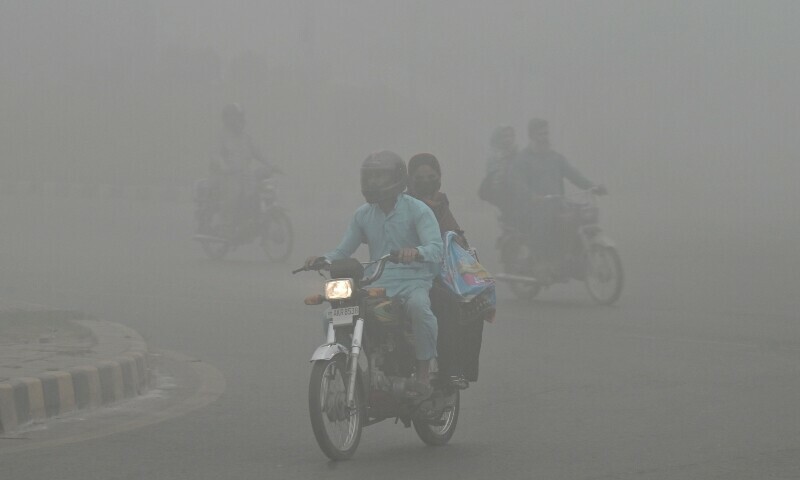
[ad_1]

The government of Punjab on Tuesday — expanding on its previous order — closed all the educational institutions up to the higher secondary level in the province from tomorrow until the end of the week, shifting them to an online mode, as the province tackles the hazardous smog situation prevalent for the past few weeks.
The recent smog situation was declared a “calamity” in Punjab last month. Schools have been closed in the province’s main divisions — Lahore, Gujranwala, Faisalabad and Multan — until November 17 in a bid to lower children’s exposure to pollution.
Separately, the public has been barred from entering public parks, zoos, playgrounds, and museums until November 17 to reduce public exposure to smog.
A day ago, the United Nations Children’s Fund (Unicef) representative in Pakistan called for urgent and greater efforts to reduce air pollution, noting that over 11 million children under five years of age were exposed to smog in the worst affected districts of Punjab.
Speaking to Dawn.com, the spokesperson of the Punjab School Education Department Noorul Huda said that “All educational institutions across the province will remain closed due to the smog situation.”
Meanwhile, the province’s Environmental Protection Agency (EPA) also said in a notification issued today, a copy of which is available with Dawn.com that “All the educational institutions […] up to higher secondary level shall remain closed and will shift to online mode with effect from Nov 13 within […] DG Khan, Bahawalpur, Sahiwal, Sargodha and Rawalpindi divisions […] till Nov 17.”
The notification said that the average AQI of Faisalabad, Multan and Gujranwala districts has crossed the “critical limit of 500” which was “alarmingly hazardous” for human health and wellbeing.
Likewise, it said, reports were being received that an “unprecedented rise in the number of patients with lungs and respiratory diseases, allergies, eye and throat irritation, pink eye disease” was being observed in different parts of the province.
“Hence, it is mandatory to take all necessary measures for prevention and control of these diseases in the whole province,” it said.
The notification added that its previous order of Nov 6 will remain intact and schools will remain closed across nine divisions of the province till the end of this week.
A day ago, the Pakistan Air Quality Experts (PAQx) also — in a letter addressing Prime Minister Shehbaz Sharif — urged the government to take immediate steps to tackle the hazardous air quality choking parts of the country such as Punjab.
50pc of govt offices to work online
Separately, all government offices were ordered to shift half of their workforce to online mode to reduce traffic load on roads to prevent the worsening of the smog situation due to vehicular emissions.
“The physical presence of human resource(s) of offices in your jurisdiction may kindly be reduced to 50pc by shifting them to online mode/work from home,” the EPA said in a separate notification issued today.
In the order issued on Tuesday, which is seen by Dawn.com, the Punjab EPA directed all the administrative secretaries, as well as heads of attached departments and semi-government/autonomous bodies, to reduce the physical presence of human resources by 50 per cent.
According to the notification, the situation was likely to prevail for a few weeks, adding that local pollution contributing factors, especially vehicular emissions, may further exacerbate the conditions.
“Hence, the situation warrants to specify safeguards to reduce the number of vehicles on roads in order to control air pollution, through preparation and implementation of contingency plans,” the notification said.
The EPA also called for inter-departmental meetings to be convened in an online mode unless the physical presence of participants was “extremely necessary”.
Smog to persist in major cities as weather conditions worsen: NDMA
Meanwhile, the National Disaster Management Authority (NDMA), in an advisory issued today, said that the smog situation was expected to persist across the urban centres in Punjab and Khyber Pakhtunkhwa throughout November and December due to high humidity, low wind speeds, and upper atmospheric pressure.
According to the advisory, as reported by the Associated Press of Pakistan (APP) the cities most likely to be affected by the worsening smog situation include Lahore, Faisalabad, Multan, Bahawalpur, Peshawar, Mardan, and Nowshera.
“The advisory highlights the rising smog levels in the affected areas, driven by the current weather conditions, and advises residents to avoid prolonged outdoor exposure and adopt protective measures to safeguard their health,” the *APP report said.
“[…] The National Emergency Operation Centre has been monitoring the current smog situation in Pakistan and surrounding regions.
According to the advisory, the team has access to advanced ground-based and space-based monitoring tools, enabling the analysis and projection of pollution emissions from various sources, including industry, transportation, and agriculture.
Precautionary measures
The NDMA advisory recommended the public adopt several measures to mitigate the effects of smog, such as avoiding unnecessary outdoor exposure during peak smog hours, especially in the morning, and wearing masks during outdoor activities, according to the APP.
“Staying hydrated, using dehumidifiers and air purifiers to improve indoor air quality, and adopting efficient transportation methods—like carpooling and eco-friendly driving, along with using COx and NOx filters—are also advised,” it said.
[ad_2]
Source link






